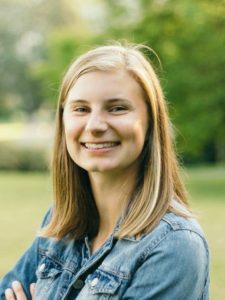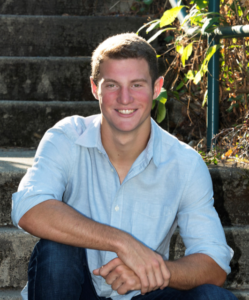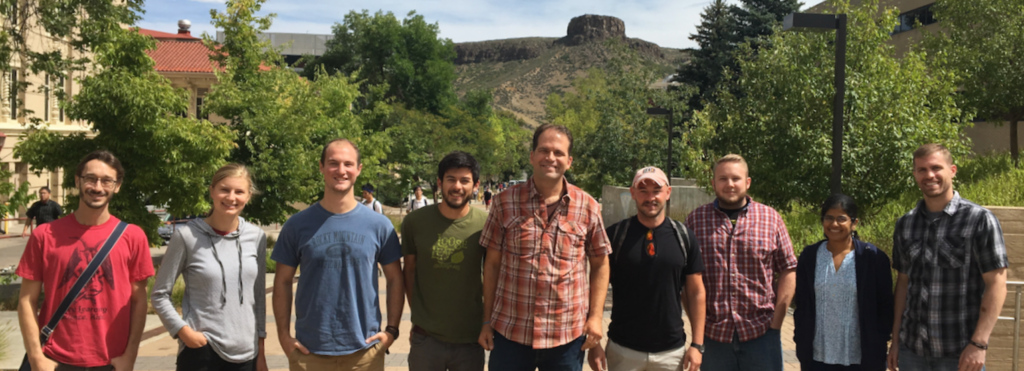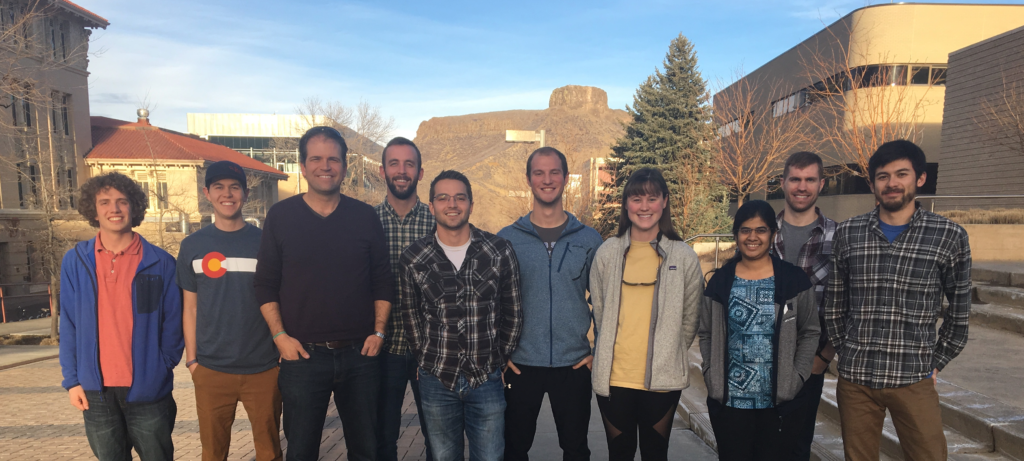
Graduate Students (Listed Chronologically)
Graduate Students (Listed Chronologically)
Daniel Korff, Doctoral Student
 Daniel’s research is focused on modeling Lithium-Sulfur (Li-S) batteries and understanding how the level of detail in chemical mechanism and transport process models used influence predicted results. Due to the soluble nature of intermediate species formed during Li-S battery operation, the reaction mechanism and transport model used in numerical simulations has a significant impact on performance predictions.
Daniel’s research is focused on modeling Lithium-Sulfur (Li-S) batteries and understanding how the level of detail in chemical mechanism and transport process models used influence predicted results. Due to the soluble nature of intermediate species formed during Li-S battery operation, the reaction mechanism and transport model used in numerical simulations has a significant impact on performance predictions.
Daniel’s work will develop experimentally-validated modeling tools to explore changes in Li-S battery design and how novel designs and materials can improve battery performance and lifetime.
Daniel received his BS in Mechanical Engineering from Rose-Hulman Institute of Technology in 2016 and worked at United Technologies before returning to graduate school at Colorado School of Mines.
Publications
S. Sripad, D. Korff, S. C. DeCaluwe, and V. Viswanathan, “Kinetics of lithium electrodeposition and stripping”, J. Chem. Phys., 153, 194701 (2020) https://doi.org/10.1063/5.0023771
D. Korff, A. M. Colclasure, Y. Ha, K. A. Smith, and S. C. DeCaluwe, “Pathways Toward High-energy Li-Sulfur Batteries Identified via Multi-reaction Chemical Modeling”, J. Electrochem. Soc., 169 010520 (2022) https://doi.org/10.1149/1945-7111/ac4541

Zoey Huey, Doctoral Student
Keywords: Batteries, microscopy & characterization, solid electrolyte interphase
Research Overview:
- Nanoscale electrical property mapping (SSRM) of composite silicon electrodes to understand links to performance and degradation
- Development of nanoscale mechanical measurement application for composite electrodes
Publications
Melissa Popeil, Doctoral Student
Melissa is a PhD student in the Advanced Energy Systems Program at Mines, working with the CORES Research Group and researchers at NREL. Her work aims to develop tools that measure finely-resolved 3D nanostructures in battery electrodes, and import this information into new modeling tools to correlate structure with performance. With this information, her work will help guide designs of efficient and durable batteries for applications such as electric vehicles. The tools she develops will also be usable by researchers across a range of advance manufacturing applications.
Undergraduate Students (Listed Chronologically)
Undergraduate Students (Listed Chronologically)
Past Members (Listed Chronologically)
Past Members (Listed Chronologically)
Melodie Chen-Glasser, (Ph.D., 2023)
 Keywords: Life Cycle Analysis, Batteries, Experimental Characterization
Keywords: Life Cycle Analysis, Batteries, Experimental Characterization
Research Overview:
- Experimental analysis (AFM, QCM, XPS) of Li-Metal and Li-Air batteries
- Lifecycle analysis using OpenLCA and ecoinvent
- Battery modeling using python and CANTERA
Publications:

Corey R. Randall (Ph.D., 2023)
Keywords: Polymer Characterization, Electrochemistry, Computational Modeling
Research Overview:
- Investigating substrate impacts on thin-film Nafion structures (Neutron reflectometry)
- Quantifying the diffusion and kinetics of water in thin-film Nafion (QCM)
- Incorporating experimentally informed transport properties into physics-based PEMFC models
Publications:
Caleb Stetson (Ph.D., 2020)
Keywords: Silicon anodes, Solid Electrolyte Interphase, Microscopy and Characterization
Research Overview:
- Scanning-spreading resistance microscopy
- Solid electrolyte interphase depth profiling
- Silicon anode evolution and degradation
Post-graduate work:
- Post-doctoral researcher at Idaho National Laboratory

Jamie Kee (PhD, 2020)
 Jamie’s research focused on the use of protonic-ceramic membrane devices for reforming, separation, and compression of Hydrogen fuel from readily available fuels such as methane and ethanol.
Jamie’s research focused on the use of protonic-ceramic membrane devices for reforming, separation, and compression of Hydrogen fuel from readily available fuels such as methane and ethanol.
Protonic-ceramic membranes are high-temperature membranes that conduct protons, oxygen ions, and electrons. The membrane operating conditions and material compatibility allow for creative process intensification technologies. However, the complex and interrelated conduction pathways also require additional understanding, to enable scientifically-guided device design. This research focuses on combining steam methane reforming, hydrogen separation, and hydrogen compression while operating at autothermal conditions. Jamie’s work uses a mixture of experiments and numerical simulation to understand and overcome limitations in this emerging technology.
Jamie earned his Masters of Science degree in the CORES Group in summer, 2016. Thesis topic: “The effect of membranes in methane dehydroaromatization on a bifunctional Mo/H-ZSM-5 catalyst in a packed bed reactor.”
Jamie is currently a postdoctoral researcher at Washington State University
Publications
M. Mayur, S. C. DeCaluwe, B. L. Kee, W. G. Bessler, “Modeling and simulation of the thermodynamics of lithium-ion battery intercalation materials in the open-source software Cantera.” Electrochim. Acta, 323, 2019, 134797. Citations: 1.
Kee, B.L.; Curran, D.; Zhu, H.; Braun, R.J.; DeCaluwe, S.C.; Kee, R.J.; Ricote, S. “Thermodynamic Insights for Electrochemical Hydrogen Compression with Proton-Conducting Membranes.” Membranes, 9(7), 2019, 77.
Kee, B., Karakaya, C., Zhu, H. DeCaluwe, S.C., Kee, R.J., “The influence of hydrogen-permeable membranes and pressure on methane dehydroaromatization in packed-bed catalytic reactors.” Ind. Eng. Chem. Res., 56(13), 2017, p. 3551—3559. Citations: 6.
Sarena Nguyen
Sarena assisted in the design and setup of experiments to understand the effects of conductive binders on lithium-air battery performance. Lithium-air batteries have the potential to increase the range of electric vehicles, due to their higher theoretical energy density. At this time however, the cells still have limitations that make it difficult for commercial use. Her project aimed to understand the effect of a non-conductive PTFE and a conductive Nafion binder on battery performance. The cells will be tested on their discharge capacity, life cycle degradation, and visual quality using scanning electron microscopy methods. Additional efforts will be made to model the system numerically to predict performance.
Sarena graduated in 2021 with a BS in Chemical Engineering from the Colorado School of Mines/ She was an Undergraduate Research Ambassador and University Innovation Fellow. Her work was funded by a Mines Undergraduate Research Fellowship, and by the Department of Energy Office of Basic Energy Sciences.
Sarena is currently a Process Engineer at Procter & Gamble.
Amy Lebar (MS, 2019)
 Amy’s research involved a promising new technology in electric vehicles and renewable energy storage: Li-air batteries. Her work investigated the effects of conductive polymer binders in Li-air battery cathodes on battery performance, as well as improving understanding of the polymer’s stability and function in these batteries. Her primary objective is to design and assemble the experimental setup to measure these effects via various tests. Amy established protocols for battery fabrication, assembly, and testing, and constructed a 1D numerical simulation tool to help interpret experimental results.
Amy’s research involved a promising new technology in electric vehicles and renewable energy storage: Li-air batteries. Her work investigated the effects of conductive polymer binders in Li-air battery cathodes on battery performance, as well as improving understanding of the polymer’s stability and function in these batteries. Her primary objective is to design and assemble the experimental setup to measure these effects via various tests. Amy established protocols for battery fabrication, assembly, and testing, and constructed a 1D numerical simulation tool to help interpret experimental results.
Extending Amy’s work will help researchers develop conductive polymer binders and battery micro-stores for efficient and durable Li-air batteries. Efficient and light-weight Li-air batteries would enable electric vehicles with longer driving ranges.
Amy earned her Bachelor’s Degree in Mechanical Engineering from the University of Portland in May of 2017. She graduated with her Master’s degree from the Colorado School of Mines in August, 2019, thesis title: “Quantifying the Effect of Conductive Polymer Binders on Li-O2 Battery Performance.” Amy now works at the National Renewable Energy Laboratory.
Daniel Dickason (BS, 2019)
 Daniel assisted in the design and assembly of experimental infrastructure for the testing of lithium air batteries. These tests included electrochemical testing, coupled with mass spectometry of the exhaust gases (i.e. Differential Electrochemical Mass Spectometry, DEMS) for detailed analysis of the dominant reaction pathways in the operating batteries. These experiments required precise control of the battery’s temperature and the composition of the gases sent to the battery cathode.
Daniel assisted in the design and assembly of experimental infrastructure for the testing of lithium air batteries. These tests included electrochemical testing, coupled with mass spectometry of the exhaust gases (i.e. Differential Electrochemical Mass Spectometry, DEMS) for detailed analysis of the dominant reaction pathways in the operating batteries. These experiments required precise control of the battery’s temperature and the composition of the gases sent to the battery cathode.
Daniel’s work was funded by the Department of Energy and a CSM Undergraduate Research Fellowship.
Daniel graduated with a Bachelor of Science in Mechanical Engineering in May, 2019.
John Fischer (BS, 2018)
 John conducted research in the DeCaluwe group from Fall 2014 through his graduation, in Spring, 2018. John’s work focused on exploring the structure-property relationsips for thin-film Nafion, to understand transport limitations in low-temperature PEM Fuel Cells. John’s work has utilized a mixture of numerical simulations and advanced characterization techniques, such as neutron reflectometry, quartz crystal microbalance, and spectroscopic ellispsometry.
John conducted research in the DeCaluwe group from Fall 2014 through his graduation, in Spring, 2018. John’s work focused on exploring the structure-property relationsips for thin-film Nafion, to understand transport limitations in low-temperature PEM Fuel Cells. John’s work has utilized a mixture of numerical simulations and advanced characterization techniques, such as neutron reflectometry, quartz crystal microbalance, and spectroscopic ellispsometry.
John’s awards include a CSM Undergraduate Research Fellowship and a NIST Summer Undergraduate Research Fellowship, as well as internships at Gates Corporation and Tesla Motor Corp. After graduation in May of 2018, John joined the Process Engineering group at Tesla Motor Corp. in Fremont, CA. He currently works at Sierra Nevada Corp. His interests include energy production and storage technologies, sustainability, polymers, and advanced manufacturing.
Publications: DeCaluwe, S.C., Baker, A.M., Bhargava, P., Fischer, J.E., Dura, J.A., “Structure-property relationships at Nafion thin-film interfaces: Thickness effects on hydration and anisotropic ion transport.” Nano Energy, 46, 2018, p. 91—100.
Brooke Cawthon (BS, 2018)
 Brooke conducted research in the DeCaluwe from from Fall, 2017, until her graduation in Spring, 2018. She researched material sets for efficient and durable lithium-O2 batteries, with a focus on understanding the role of conductive polymer binders in the battery cathodes. Brooke was essential in building key battery fabrication infrastructure and protocols in our lab.
Brooke conducted research in the DeCaluwe from from Fall, 2017, until her graduation in Spring, 2018. She researched material sets for efficient and durable lithium-O2 batteries, with a focus on understanding the role of conductive polymer binders in the battery cathodes. Brooke was essential in building key battery fabrication infrastructure and protocols in our lab.
Brooke majored in Mechanical Engineering and minoring in Public Affairs through the CSM Honors Program. After graduation, in May 2018, Brooke joined ExxonMobil in their Baton Rouge Refinery and Chemical Plant as a Contact Engineer, troubleshooting failures and managing the long-term maintenance of large mechanical systems.
Spencer Gilleon (MS, 2018)
 Spencer’s work focused on pore-scale transport phenomena and the microstructural characterization of porous membranes used in membrane desalination (MD). He uses focused ion beam scanning electron microscopy (FIB-SEM) to render 3D membrane reconstructions that enable analysis of microstructural parameters such as porosity, tortuosity and pore diameter. Understanding these parameters at the pore scale can lead to new design criteria and optimization of the MD process.
Spencer’s work focused on pore-scale transport phenomena and the microstructural characterization of porous membranes used in membrane desalination (MD). He uses focused ion beam scanning electron microscopy (FIB-SEM) to render 3D membrane reconstructions that enable analysis of microstructural parameters such as porosity, tortuosity and pore diameter. Understanding these parameters at the pore scale can lead to new design criteria and optimization of the MD process.
Spencer has developed an experimental protocol that allows for proper infiltration and sample preparation needed to study MD membranes with FIB-SEM. He has coupled these results with porous media transport models such as the Dusty Gas Model. Doing so allows for more accurate simulations when determining water vapor flux through MD membranes.
Spencer earned his Master of Science degree in the CORES Group in Summer 2018. Thesis topic: “The Influence of Microstructure on Membrane Distillation: High-Resolution 3D Reconstructions for Analysis of Pore-scale Phenomena”
Christopher H. Lee (MS, 2016)
 Christopher’s research focused on characterizing the solid electrolyte interphase (SEI), a thin protective layer that forms in lithium ion batteries. Long-term degradation of the SEI severely limits battery durability and safety. Improving the SEI durability is limited by poor understanding of its properties, and Chris’s work used neutron reflectometry and quartz crystal microbalance to measure the SEI composition and structure.
Christopher’s research focused on characterizing the solid electrolyte interphase (SEI), a thin protective layer that forms in lithium ion batteries. Long-term degradation of the SEI severely limits battery durability and safety. Improving the SEI durability is limited by poor understanding of its properties, and Chris’s work used neutron reflectometry and quartz crystal microbalance to measure the SEI composition and structure.
Christopher earned his Masters of Science degree in 2016. Thesis topic: “Multimodal evaluation of the lithium ion battery solid electrolyte interphase: Quantifying elementary chemistry via in operando neutron refectivity and electrochemical quartz crystal microbalance.”
Christopher received the “Outstanding Student Poster” Award at the 37th Annual Symposium on Applied Surface Science (AVS).
Christopher is currently pursuing a graduate degree in Computer Science at University of Colorado, Colorado Springs.
Lab Mascots
Ocoee
 Supervisor: Steven C. DeCaluwe
Supervisor: Steven C. DeCaluwe
Research Interests:
- Acoustic impedance analysis of doorbell-bark interactions
- Thermal radiation heat transfer of various sunlit windows
- Human telepathy innovations in treat delivery demand scheduling
 Luna
Luna
Supervisor: Zoey Huey
Research interests:
- Cardboard box disassembly
- Coziness optimization
- Yelling
Six Fish!
 Supervisor: Steven C. DeCaluwe
Supervisor: Steven C. DeCaluwe
Research Contributions:
- In situ examination of complex fluid dynamics
- Cultivation of algae for biofuels
- Meditation on the nature of the universe
Graduated Mascots
Graduated Mascots
Indie (Ph.D., 2023)
 Supervisor: Corey R. Randall
Supervisor: Corey R. Randall
Research Interests:
- Exploring nature through long walkies/hikes
- Searching for the best spot to get scratchies
- Taste testing delicious treats
Blythia Catstina (Ph.D. 2023)
 Supervisor: Melodie Chen-Glasser
Supervisor: Melodie Chen-Glasser
Research Contributions:
- Debugging code and editing manuscripts
- Testing integrity of electrical connections and equipment placement
- Surprise PPE assessments through physical and vocal attacks
Cyon Chien-Glasser (Ph.D., 2023)
 Supervisor: Melodie Chen-Glasser
Supervisor: Melodie Chen-Glasser
Research Interests:
- Exploring which activities involving running REAL fast are most exciting (cat chasing?, bike joring?)
- Examining long term heath impacts of unhinged consumption of prickly pears and plastic
- Howling at life’s injustices (being denied prickly pears and plastic)
Previous Group Photos
2020

2019

2018

2017




